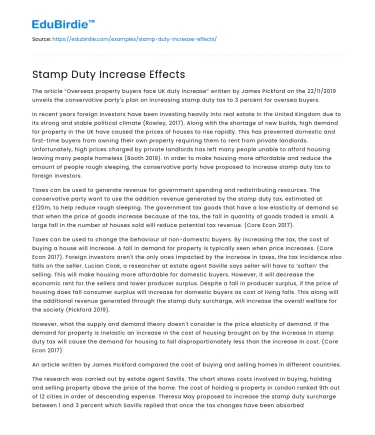The article “Overseas property buyers face UK duty increase” written by James Pickford on the 22/11/2019 unveils the conservative party's plan on increasing stamp duty tax to 3 percent for oversea buyers.
In recent years foreign investors have been investing heavily into real estate in the United Kingdom due to its strong and stable political climate (Rowley, 2017). Along with the shortage of new builds, high demand for property in the UK have caused the prices of houses to rise rapidly. This has prevented domestic and first-time buyers from owning their own property requiring them to rent from private landlords. Unfortunately, high prices charged by private landlords has left many people unable to afford housing leaving many people homeless (Booth 2019). In order to make housing more affordable and reduce the amount of people rough sleeping, the conservative party have proposed to increase stamp duty tax to foreign investors.
Save your time!
We can take care of your essay
- Proper editing and formatting
- Free revision, title page, and bibliography
- Flexible prices and money-back guarantee
Taxes can be used to generate revenue for government spending and redistributing resources. The conservative party want to use the addition revenue generated by the stamp duty tax, estimated at £120m, to help reduce rough sleeping. The government tax goods that have a low elasticity of demand so that when the price of goods increase because of the tax, the fall in quantity of goods traded is small. A large fall in the number of houses sold will reduce potential tax revenue. (Core Econ 2017).
Taxes can be used to change the behaviour of non-domestic buyers. By increasing the tax, the cost of buying a house will increase. A fall in demand for property is typically seen when price increases. (Core Econ 2017). Foreign investors aren't the only ones impacted by the increase in taxes, the tax incidence also falls on the seller. Lucian Cook, a researcher at estate agent Saville says seller will have to ‘soften’ the selling. This will make housing more affordable for domestic buyers. However, it will decrease the economic rent for the sellers and lower producer surplus. Despite a fall in producer surplus, if the price of housing does fall consumer surplus will increase for domestic buyers as cost of living falls. This along will the additional revenue generated through the stamp duty surcharge, will increase the overall welfare for the society (Pickford 2019).
However, what the supply and demand theory doesn't consider is the price elasticity of demand. If the demand for property is inelastic an increase in the cost of housing brought on by the increase in stamp duty tax will cause the demand for housing to fall disproportionately less than the increase in cost. (Core Econ 2017)
An article written by James Pickford compared the cost of buying and selling homes in different countries.
The research was carried out by estate agent Savills. The chart shows costs involved in buying, holding and selling property above the price of the home. The cost of holding a property in London ranked 9th out of 12 cities in order of descending expense. Theresa May proposed to increase the stamp duty surcharge between 1 and 3 percent which Savills replied that once the tax changes have been absorbed into the market, London will not look uncompetitive in relation to international market. This suggests that there is a low elastic demand for property in London. (Pickford 2018). Despite an increase in price there was little change in demand.
The stamp duty surcharge means the top end foreign buyer could be paying as much as 18 per cent in stamp duty. Dean Clifford, a London developer says the Conservative party shouldn’t target foreign investor as it will discourage FDI. Many new city development projects are made possible by initial investments made by foreign investors say Housing policy experts. A fall in investment will lead to a fall in the supply of housing as the lack of funding leads to fewer city developments (Pickford 2019). A study looking at the housing investment and consumption in Urban China concludes an open door polices played an important role in housing investment. FDI increases housing supply by directly investing in urban housing. It also increased the demand for housing as it created job opportunities which provided its employees with a high wage. Hence this suggests FDI helps to increase the supply of housing and encourages home ownership. (Aimin et al 2014)
In conclusion the effectiveness of the stamp duty surcharge depends on the price elasticity of demand and supply of housing. If the elasticity is high, the tax will be effective in reducing the number of foreign investors and British expat buying property in the UK. A high elasticity means a change in price will cause a significantly higher percentage change in the quantity of houses sold. This however could have a negative impact on how much additional revenue the government receives. If there is a large fall in the number of foreign people buying UK property, the government may not be able to finance the project targeted at reducing rough sleeping. On the other hand, if the elasticity of demand for housing is inelastic, an increase in tax may not be effective in reducing demand from foreign buyers to the point where it encourages sellers to lower their price. (Core Econ 2017). Discouraging FDI could be counterproductive as new home buildings are primarily funded by foreigners. In the long-term lack of FDI will result in fewer housing supply and increased unemployment which will make housing even more unaffordable as population growth and demand for property outweigh the supply of new house build.






 Stuck on your essay?
Stuck on your essay?

